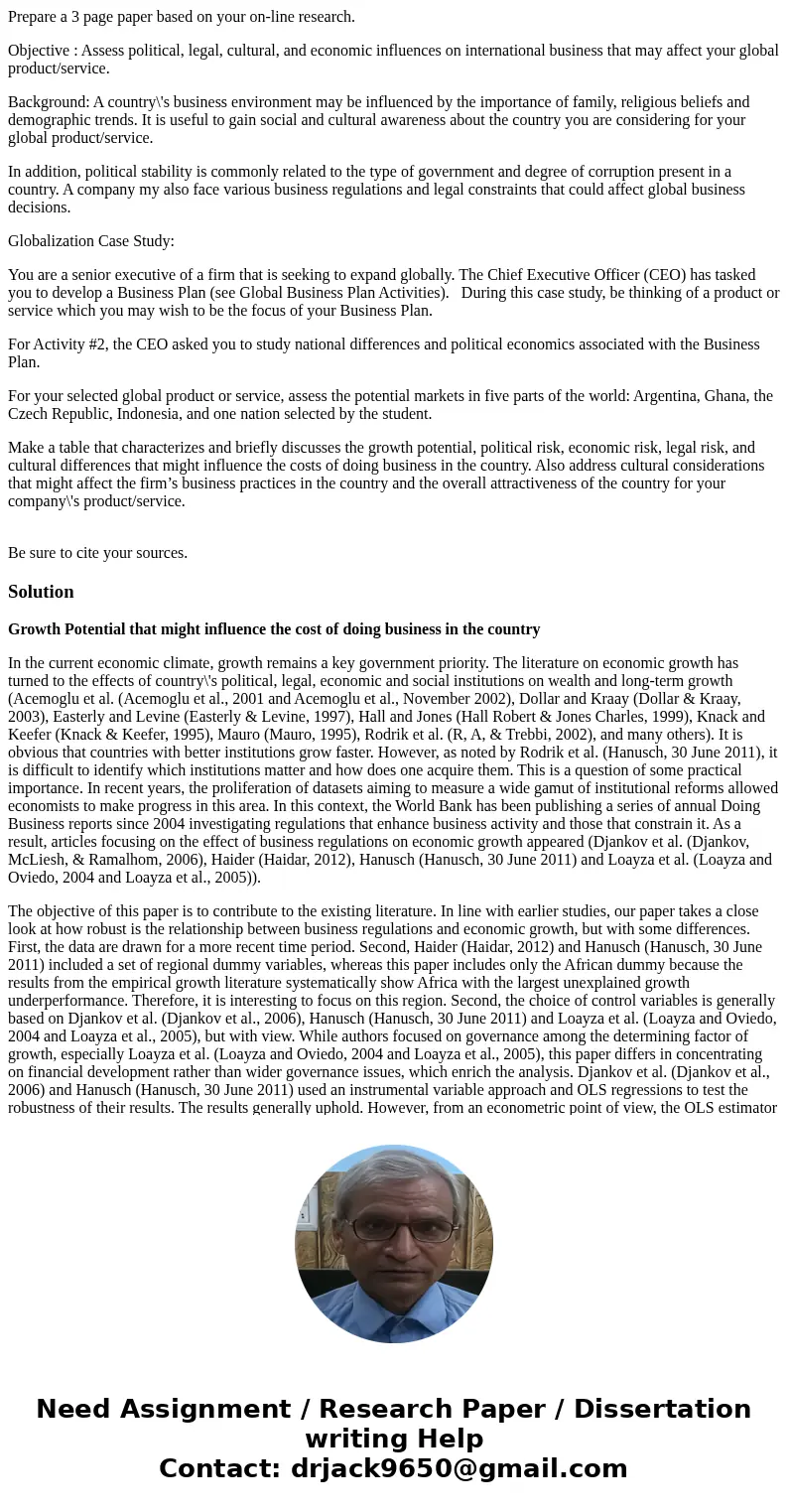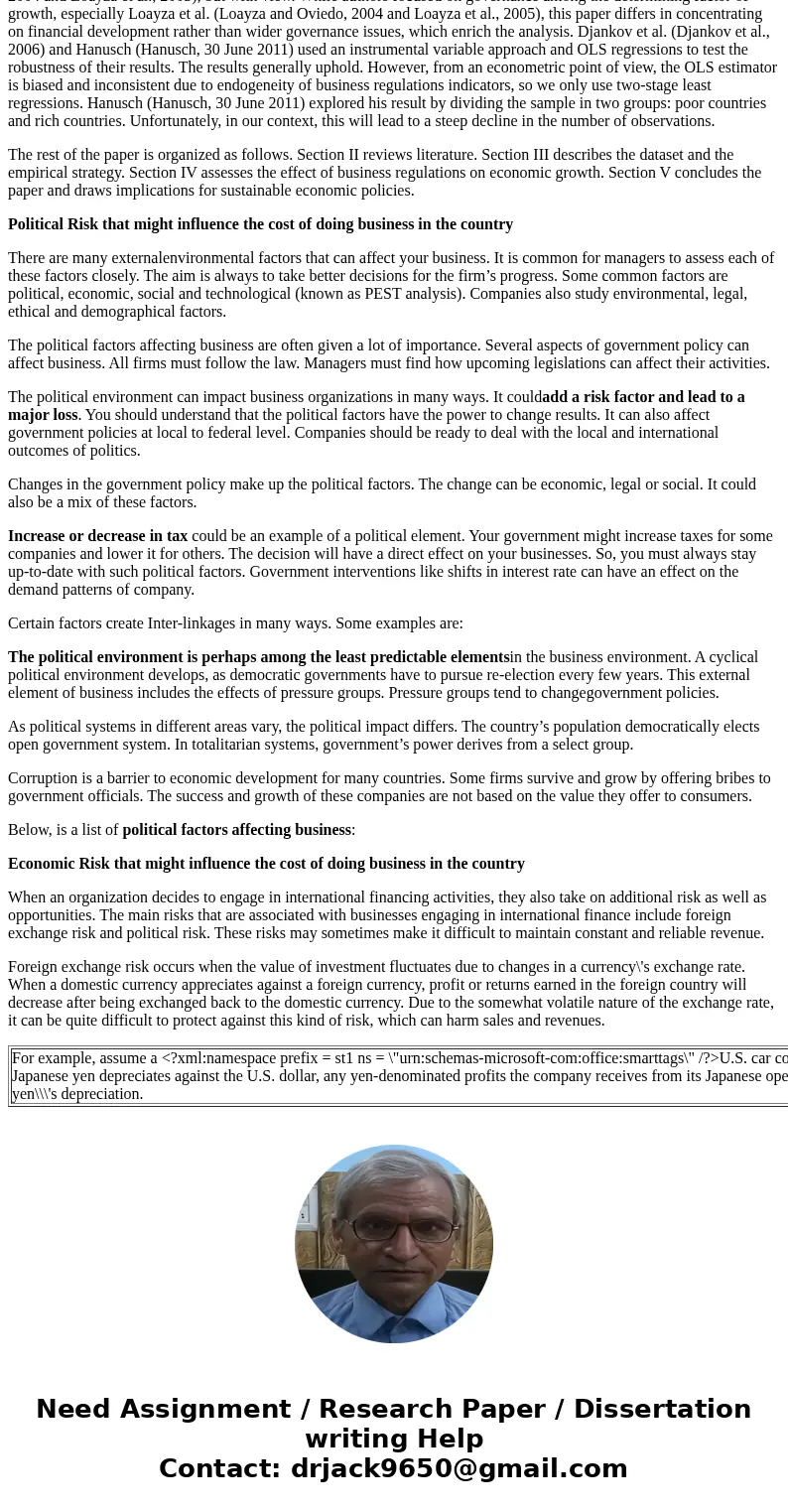Prepare a 3 page paper based on your online research Objecti
Prepare a 3 page paper based on your on-line research.
Objective : Assess political, legal, cultural, and economic influences on international business that may affect your global product/service.
Background: A country\'s business environment may be influenced by the importance of family, religious beliefs and demographic trends. It is useful to gain social and cultural awareness about the country you are considering for your global product/service.
In addition, political stability is commonly related to the type of government and degree of corruption present in a country. A company my also face various business regulations and legal constraints that could affect global business decisions.
Globalization Case Study:
You are a senior executive of a firm that is seeking to expand globally. The Chief Executive Officer (CEO) has tasked you to develop a Business Plan (see Global Business Plan Activities). During this case study, be thinking of a product or service which you may wish to be the focus of your Business Plan.
For Activity #2, the CEO asked you to study national differences and political economics associated with the Business Plan.
For your selected global product or service, assess the potential markets in five parts of the world: Argentina, Ghana, the Czech Republic, Indonesia, and one nation selected by the student.
Make a table that characterizes and briefly discusses the growth potential, political risk, economic risk, legal risk, and cultural differences that might influence the costs of doing business in the country. Also address cultural considerations that might affect the firm’s business practices in the country and the overall attractiveness of the country for your company\'s product/service.
Be sure to cite your sources.
Solution
Growth Potential that might influence the cost of doing business in the country
In the current economic climate, growth remains a key government priority. The literature on economic growth has turned to the effects of country\'s political, legal, economic and social institutions on wealth and long-term growth (Acemoglu et al. (Acemoglu et al., 2001 and Acemoglu et al., November 2002), Dollar and Kraay (Dollar & Kraay, 2003), Easterly and Levine (Easterly & Levine, 1997), Hall and Jones (Hall Robert & Jones Charles, 1999), Knack and Keefer (Knack & Keefer, 1995), Mauro (Mauro, 1995), Rodrik et al. (R, A, & Trebbi, 2002), and many others). It is obvious that countries with better institutions grow faster. However, as noted by Rodrik et al. (Hanusch, 30 June 2011), it is difficult to identify which institutions matter and how does one acquire them. This is a question of some practical importance. In recent years, the proliferation of datasets aiming to measure a wide gamut of institutional reforms allowed economists to make progress in this area. In this context, the World Bank has been publishing a series of annual Doing Business reports since 2004 investigating regulations that enhance business activity and those that constrain it. As a result, articles focusing on the effect of business regulations on economic growth appeared (Djankov et al. (Djankov, McLiesh, & Ramalhom, 2006), Haider (Haidar, 2012), Hanusch (Hanusch, 30 June 2011) and Loayza et al. (Loayza and Oviedo, 2004 and Loayza et al., 2005)).
The objective of this paper is to contribute to the existing literature. In line with earlier studies, our paper takes a close look at how robust is the relationship between business regulations and economic growth, but with some differences. First, the data are drawn for a more recent time period. Second, Haider (Haidar, 2012) and Hanusch (Hanusch, 30 June 2011) included a set of regional dummy variables, whereas this paper includes only the African dummy because the results from the empirical growth literature systematically show Africa with the largest unexplained growth underperformance. Therefore, it is interesting to focus on this region. Second, the choice of control variables is generally based on Djankov et al. (Djankov et al., 2006), Hanusch (Hanusch, 30 June 2011) and Loayza et al. (Loayza and Oviedo, 2004 and Loayza et al., 2005), but with view. While authors focused on governance among the determining factor of growth, especially Loayza et al. (Loayza and Oviedo, 2004 and Loayza et al., 2005), this paper differs in concentrating on financial development rather than wider governance issues, which enrich the analysis. Djankov et al. (Djankov et al., 2006) and Hanusch (Hanusch, 30 June 2011) used an instrumental variable approach and OLS regressions to test the robustness of their results. The results generally uphold. However, from an econometric point of view, the OLS estimator is biased and inconsistent due to endogeneity of business regulations indicators, so we only use two-stage least regressions. Hanusch (Hanusch, 30 June 2011) explored his result by dividing the sample in two groups: poor countries and rich countries. Unfortunately, in our context, this will lead to a steep decline in the number of observations.
The rest of the paper is organized as follows. Section II reviews literature. Section III describes the dataset and the empirical strategy. Section IV assesses the effect of business regulations on economic growth. Section V concludes the paper and draws implications for sustainable economic policies.
Political Risk that might influence the cost of doing business in the country
There are many externalenvironmental factors that can affect your business. It is common for managers to assess each of these factors closely. The aim is always to take better decisions for the firm’s progress. Some common factors are political, economic, social and technological (known as PEST analysis). Companies also study environmental, legal, ethical and demographical factors.
The political factors affecting business are often given a lot of importance. Several aspects of government policy can affect business. All firms must follow the law. Managers must find how upcoming legislations can affect their activities.
The political environment can impact business organizations in many ways. It couldadd a risk factor and lead to a major loss. You should understand that the political factors have the power to change results. It can also affect government policies at local to federal level. Companies should be ready to deal with the local and international outcomes of politics.
Changes in the government policy make up the political factors. The change can be economic, legal or social. It could also be a mix of these factors.
Increase or decrease in tax could be an example of a political element. Your government might increase taxes for some companies and lower it for others. The decision will have a direct effect on your businesses. So, you must always stay up-to-date with such political factors. Government interventions like shifts in interest rate can have an effect on the demand patterns of company.
Certain factors create Inter-linkages in many ways. Some examples are:
The political environment is perhaps among the least predictable elementsin the business environment. A cyclical political environment develops, as democratic governments have to pursue re-election every few years. This external element of business includes the effects of pressure groups. Pressure groups tend to changegovernment policies.
As political systems in different areas vary, the political impact differs. The country’s population democratically elects open government system. In totalitarian systems, government’s power derives from a select group.
Corruption is a barrier to economic development for many countries. Some firms survive and grow by offering bribes to government officials. The success and growth of these companies are not based on the value they offer to consumers.
Below, is a list of political factors affecting business:
Economic Risk that might influence the cost of doing business in the country
When an organization decides to engage in international financing activities, they also take on additional risk as well as opportunities. The main risks that are associated with businesses engaging in international finance include foreign exchange risk and political risk. These risks may sometimes make it difficult to maintain constant and reliable revenue.
Foreign exchange risk occurs when the value of investment fluctuates due to changes in a currency\'s exchange rate. When a domestic currency appreciates against a foreign currency, profit or returns earned in the foreign country will decrease after being exchanged back to the domestic currency. Due to the somewhat volatile nature of the exchange rate, it can be quite difficult to protect against this kind of risk, which can harm sales and revenues.
| For example, assume a <?xml:namespace prefix = st1 ns = \"urn:schemas-microsoft-com:office:smarttags\" /?>U.S. car company receives a majority of its business in Japan. If the Japanese yen depreciates against the U.S. dollar, any yen-denominated profits the company receives from its Japanese operations will yield fewer U.S. dollars compared to before the yen\\\'s depreciation. |


 Homework Sourse
Homework Sourse